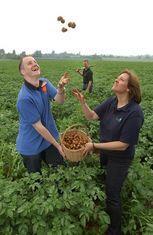
When Derek Benjamin was installed as potato buyer at Sainsbury’s 10 months ago, one of the first issues he set out to tackle - with his suppliers - was the needs of his customer base. Analysis of British Potato Council and Sainsbury’s consumer data revealed three major priorities for the Sainsbury’s spud shopper.
“The three things that top the customers’ wish list were variety, regionality and usage,” says Benjamin. “In other words, they wanted us to tell them what kind of potato they were buying, where it came from and what to do with it.”
It emerged that customers would prefer to buy potatoes that they knew were regionally grown. “I’m the same,” admits Benjamin. “I’d be more likely to pick up a bag of potatoes if I knew they’d come from just down the road.”
The first part of the task complete, the next job was to act on the findings in a way that could match the Sainsbury’s potato offer to customer ideals. As a result of its pan-UK presence, Greenvale AP was elected project manager for an initiative that took in 14 growers of new potatoes across the UK, with each harvesting their spuds on the same morning as delivery to their nearest stores, taking local sourcing to its logical extreme.
The scheme had been successfully trialled by Sainsbury’s and Greenvale AP in Shropshire stores last year. The farmers taking part in 2004 were in Norfolk, Somerset, Cheshire, Staffordshire, Carmarthenshire, Hereford and Cornwall.
Greenvale has always placed a strong focus on early production. Its growers responded enthusiastically to the opportunity to see their produce marketed locally, as did those working through counterpart Sainsbury’s suppliers. Greenvale AP worked with QV Foods, MBM and Hoché to firstly draft a list of growers and county town stores that suited the desired geographical spread of the project, then create a critical path of seed planting and harvest dates.
Liaising with store managers to decide upon optimum delivery dates to store, Greenvale AP and Sainsbury’s then carried out a PR exercise with local newspapers to communicate with consumers in each specific region. In three stores The Heart of England Fine Foods Group became involved, arranging a series of tasting sessions with a chef using the potatoes available within that particular store to produce a variety of dishes.
“This new scheme demonstrates a commitment to making sure that the best produce in the area stays within the region and that local people can enjoy locally sourced produce from their local Sainsbury’s store,” says Greenvale AP’s Richard Griffith. “The farmers planted, harvested and delivered the potatoes themselves, ensuring they arrive in perfect condition maintaining Greenvale AP’s reputation for providing high quality produce.”
The secret to the success of the project was its timing and key elements were continually fine-tuned as it progressed. QV Foods grower WM Kerr (Farms) Ltd, for instance, received seed during early March, which was placed in a warm area with plenty of light to ensure chits grew as rapidly as possible prior to planting. A total of 1.5 hectares of seed was purchased to maintain continuity if sales exceeded expectations and larger seed was used in order to ensure the earliest harvest date possible.
Poor weather unfortunately put back the hoped for harvest date to May 27, but the smoothest part of the process was about to begin. Stores, in Ipswich and Norwich, were contacted the day before delivery by QV Foods, which then placed the order with WM Kerr. Harvest commenced at 7am on May 27 and packing was completed by 8.30am, when the delivery vehicle left the farm gates. Product was therefore in store in bins featuring specially designed First for Fresh liners within six hours of lifting - ensuring a truly fresh display of locally grown potatoes.
All suppliers contributed to the communication process with store managers, with many assigning project managers to ensure a flow of product to store that met with Sainsbury’s specifications.
The practice was replicated in all regions and although the 2004 campaign is yet to conclude and subject to a final evaluation, already Sainsbury’s is suitably impressed to announce the extension of the scheme in 2005. “We have had extremely positive feedback from both growers and customers,” Benjamin says. “Customer comments have been excellent - they have obviously responded to the availability of local potatoes.”
Suppliers, importantly, have benefited too. “There has been a sales uplift across the board - an MBM grower, for example, has reported an increase from 8-10 cases to 17-18 cases a week into its local store,” adds Benjamin.
“One of our Welsh suppliers was previously sending its new potatoes through our Emerald Park depot in Bristol, for redistribution to Welsh stores. The cost of distribution was making its job economically unviable. This year, direct deliveries into store have turned that round and made supplying Sainsbury’s more profitable.
“We haven’t measured each region against each other, but overall we are delighted with the results we have seen to date.”
Overwhelmingly positive then, but as with any fledgling scheme, there has been the odd teething problem. “The negative aspects have been relatively minor and have mainly centred around in-store procedures, which we will iron out with our suppliers by next season. We have examples of best practice to illustrate to store produce managers how things can be improved and the sales figures should be enough to tell them the opportunity that lies in getting it right - and giving the customer exactly what they want.”
Benjamin concludes: “We are not doing something drastically different. Sainsbury’s sells thousands of tonnes of UK-grown potatoes every year and we make a point of always stocking home-grown potatoes when they are available. We are simply extending that and telling the consumers what they want to hear - that we have listened to them and acted upon it.”



